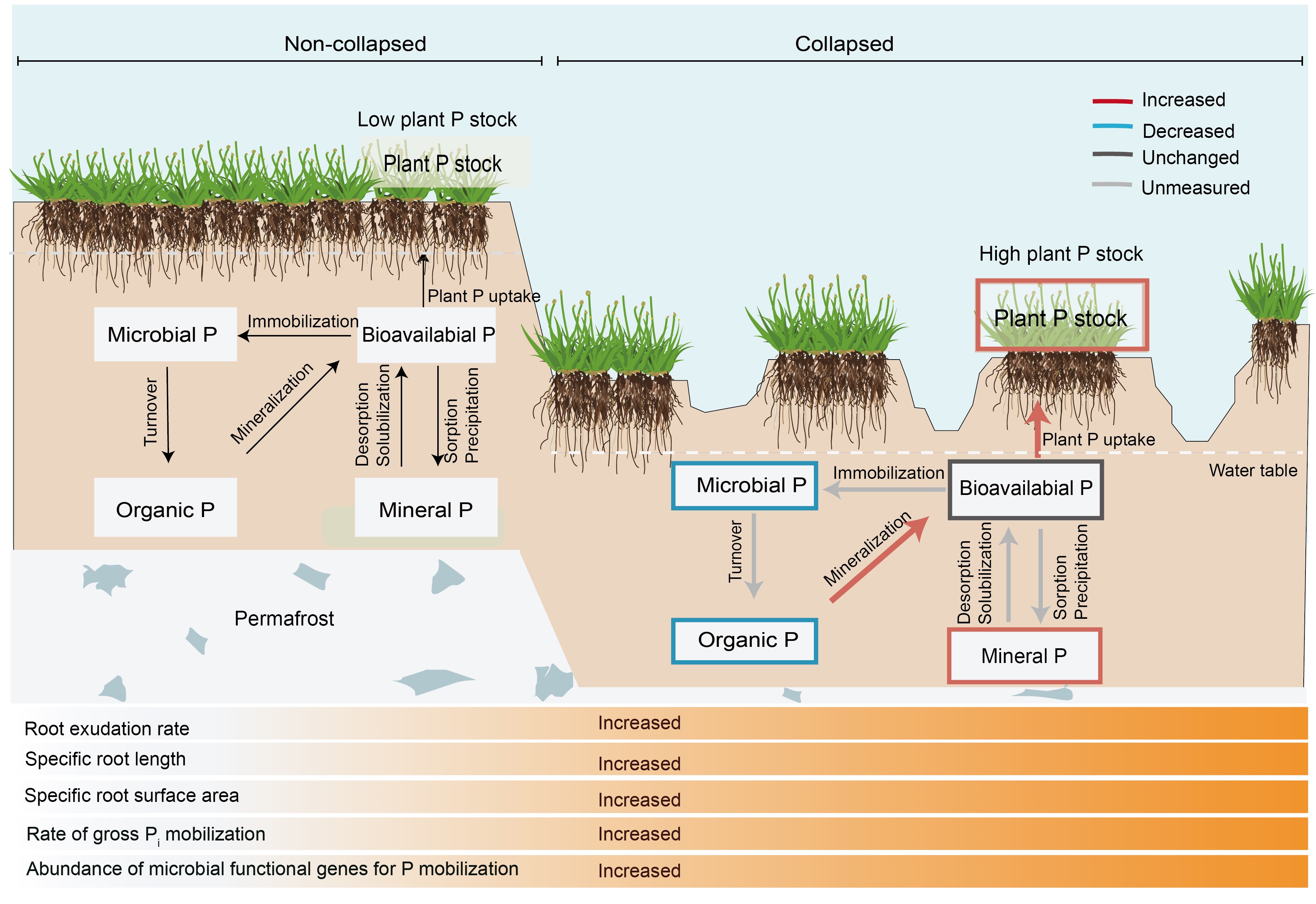Permafrost thaw can stimulate the release of soil carbon, triggering a positive carbon-climate feedback that may be mediated by changes in soil phosphorus (P) availability. A research team led by Prof. YANG Yuanhe from the Institute of Botany, the Chinese Academy of Sciences (IBCAS), reports that abrupt permafrost thaw accelerates soil P cycling, with potential consequences for plant primary productivity and carbon sequestration in permafrost ecosystems.
In this new study published in Nature Climate Change, the researchers investigate whether and how abrupt permafrost thaw affects soil P transformation processes and plant P uptake, presenting clear evidence that it accelerates soil P cycling.
Large-scale sampling across a Tibetan Plateau permafrost transect, combined with 31P-nuclear magnetic resonance spectroscopy, 33P-labelling and metagenomic sequencing, discovered that both soil P mobilization rates and plant P uptake rise after permafrost collapse. Further analysis link the increase in gross rates of P mobilization to higher abundance of P cycling functional genes. Additionally, enhanced plant P uptake coincides with changes in root morphology, increased root exudation and reduced microbial competition with plants upon permafrost collapse.
Although permafrost thaw is commonly viewed as convert the frozen carbon pools from stable sinks into potential "carbon bombs", this study shows that the same process also accelerate ecosystem P cycling, thereby enhancing ecosystem primary productivity and carbon sequestration.
These findings provide critical insights for accurately predicting the fate of permafrost carbon and for developing strategies to mitigate its impacts in climate-sensitive regions.

Conceptual diagram showing the accelerated soil P cycling upon abrupt permafrost thaw (Credit by LI Ziliang)
Permafrost thaw can stimulate the release of soil carbon, triggering a positive carbon-climate feedback that may be mediated by changes in soil phosphorus (P) availability. A research team led by Prof. YANG Yuanhe from the Institute of Botany, the Chinese Academy of Sciences (IBCAS), reports that abrupt permafrost thaw accelerates soil P cycling, with potential consequences for plant primary productivity and carbon sequestration in permafrost ecosystems.
In this new study published in Nature Climate Change, the researchers investigate whether and how abrupt permafrost thaw affects soil P transformation processes and plant P uptake, presenting clear evidence that it accelerates soil P cycling.
Large-scale sampling across a Tibetan Plateau permafrost transect, combined with 31P-nuclear magnetic resonance spectroscopy, 33P-labelling and metagenomic sequencing, discovered that both soil P mobilization rates and plant P uptake rise after permafrost collapse. Further analysis link the increase in gross rates of P mobilization to higher abundance of P cycling functional genes. Additionally, enhanced plant P uptake coincides with changes in root morphology, increased root exudation and reduced microbial competition with plants upon permafrost collapse.
Although permafrost thaw is commonly viewed as convert the frozen carbon pools from stable sinks into potential "carbon bombs", this study shows that the same process also accelerate ecosystem P cycling, thereby enhancing ecosystem primary productivity and carbon sequestration.
These findings provide critical insights for accurately predicting the fate of permafrost carbon and for developing strategies to mitigate its impacts in climate-sensitive regions.

Conceptual diagram showing the accelerated soil P cycling upon abrupt permafrost thaw (Credit by LI Ziliang)
